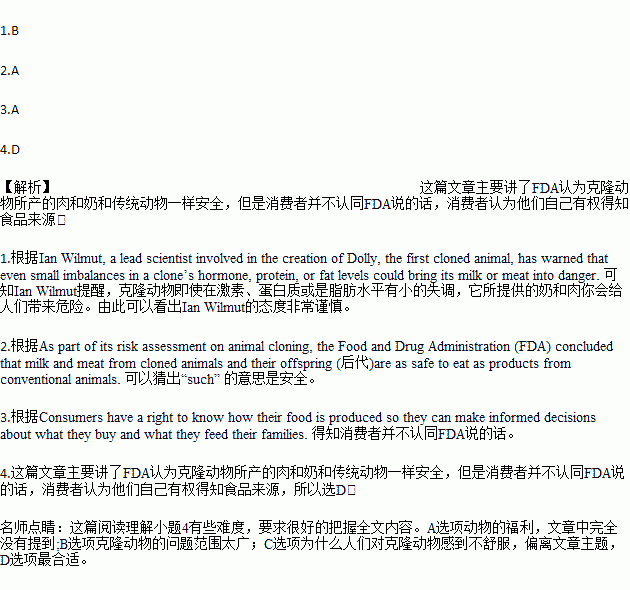题目内容
The health problems about cloned animals , particularly those who appear healthy but have hidden illnesses or problems that appear unexpectedly later in life, have the potential to cause real risks to the safety of the food products from those animals. Ian Wilmut, a lead scientist involved in the creation of Dolly, the first cloned animal, has warned that even small imbalances in a clone’s hormone, protein, or fat levels could bring its milk or meat into danger.
As part of its risk assessment on animal cloning, the Food and Drug Administration (FDA) concluded that milk and meat from cloned animals and their offspring (后代)are as safe to eat as products from conventional animals. The FDA further announced that it would not require food products from cloned animals or their offspring to be labeled as such.
Consumer watchdog groups pointed out that the FDA’s analysis was based on limited data supplied mainly from the cloning companies themselves. In addition, while food safety is an obvious concern of consumers, it is not the only issue that makes people uncomfortable with animal cloning. For example, surveys indicate that 63 percent of consumers would not buy food from cloned animals even if it were labeled as “safe”. Concerns about the morality of cloning, as well as concerns for animal welfare, lead a big majority of people to oppose cloning animals for  food. However, these issues were not considered by the FDA. Without labels to identify cloned foods, consumers who oppose animal cloning would be forced to make purchases against their p
food. However, these issues were not considered by the FDA. Without labels to identify cloned foods, consumers who oppose animal cloning would be forced to make purchases against their p rinciples without knowing. Consumers have a right to know how their food is produced so they can make informed decisions about what they buy and what they feed their families.
rinciples without knowing. Consumers have a right to know how their food is produced so they can make informed decisions about what they buy and what they feed their families.
1.What is Ian Wilmut’s attitude towards food products from cloned animals?
A. Approving. B. Cautious.
C. Uncertain. D. Indifferent.
2.What does the underlined word “such” in Paragraph 2 refer to ?
A. Safe. B. Expensive
C. Unsafe D. Conventional.
3.We can learn from the last paragraph that _____.
A. consumers didn’t believe what the FDA said
B. the FDA took consumers’ concerns seriously
C. consumers were well-informed about the safety of food
D. the FDA forced consumers to buy things they didn’t want
4.What is the main idea of the text?
A. Concerns for animal welfare.
B. The problems with animal cloning.
C. Why people are uncomfortable with animal cloning.
D. Concerns about the food products from cloned animals.


 -hour walking tour,we share these special comers of NYC.
-hour walking tour,we share these special comers of NYC. itional Chinese calendar;糯米——glutinous rice;竹叶或芦苇叶——bamboo or reed leaf;自尽——commit suicide
itional Chinese calendar;糯米——glutinous rice;竹叶或芦苇叶——bamboo or reed leaf;自尽——commit suicide